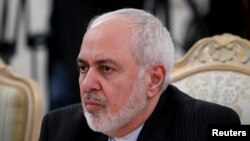The U.S. won't issue Iran's foreign minister a visa to travel to the United Nations later this week, contending there was not enough time to process the request.
Mohammed Javad Zarif told “CBS This Morning” on Tuesday that Secretary of State Mike Pompeo informed the U.N. secretary general, who in turn relayed the information to Zarif.
Zarif's trip would have been an opportunity for him to discuss the U.S. killing of a top Iranian general in Baghdad last week. That targeted killing has escalated tensions with Iran, which has vowed to retaliate.
A U.S. official said Tuesday the application couldn't be processed in time for Zarif's travel although it wasn't clear if his request had been formally denied. A formal rejection would trigger legal technicalities that could affect future visa applications and could also violate the host country agreement the U.S. has with the U.N. The official wasn't authorized to speak on the record and discussed the matter on condition of anonymity.
The State Department declined to comment on the matter, citing visa confidentiality laws that bar the release of such information with certain limited exceptions, and Pompeo himself would not discuss specifics of the situation while briefing reporters.
“We don't comment on visa matters of those traveling here to the United States on visas, so I can't add much more on this issue of Foreign Minister Zarif's travel to the United States,” he said. “I'll say only this: We will always comply with our obligations under the U.N. requirements, the headquarters agreement, and we will do so in this particular instance and more broadly.”
Pompeo's remarks appeared to suggest that the U.S. believes it remains in compliance with the headquarters agreement as long as the visa was not formally rejected.
At the White House earlier Tuesday, national security adviser Robert O'Brien told “Fox & Friends,” “I don't think Secretary Pompeo thought that this was the right time for Mr. Zarif to come to the United States.”
“This is because they fear someone will go there and tell the truth to the American people,” Zarif said earlier Tuesday.”`But they are mistaken. The world is not limited to New York. You can speak with American people from Tehran, too, and we will do that.”
Zarif had applied for the visa in order to speak to a U.N. Security Council session Thursday about the importance of upholding the U.N. charter.
“Whenever he comes to New York, he spreads propaganda,” O'Brien said. “I actually find it somewhat ironic that Mr. Zarif wants to take advantage of the diplomatic niceties of being able to come to New York and come to the U.N. when his revolution was born in the taking of 52 American diplomats hostage in Iran and holding them for 444 days. He can certainly call in to the meeting or he can participate by video teleconference and his voice will be heard if he wants to be heard.”
Under its obligations as the host country of the U.N. headquarters, the U.S. is required in most circumstances to issue visas to foreign officials for meetings at the world body. However, there are exceptions and the U.S. has severely restricted the movements of Iranian diplomats in New York in the past. It has also moved to bar non-U.N.-related travel by other foreign officials, notably the chief prosecutor of the International Criminal Court.
US Won't Grant Iran Foreign Minister Visa for UN Visit




